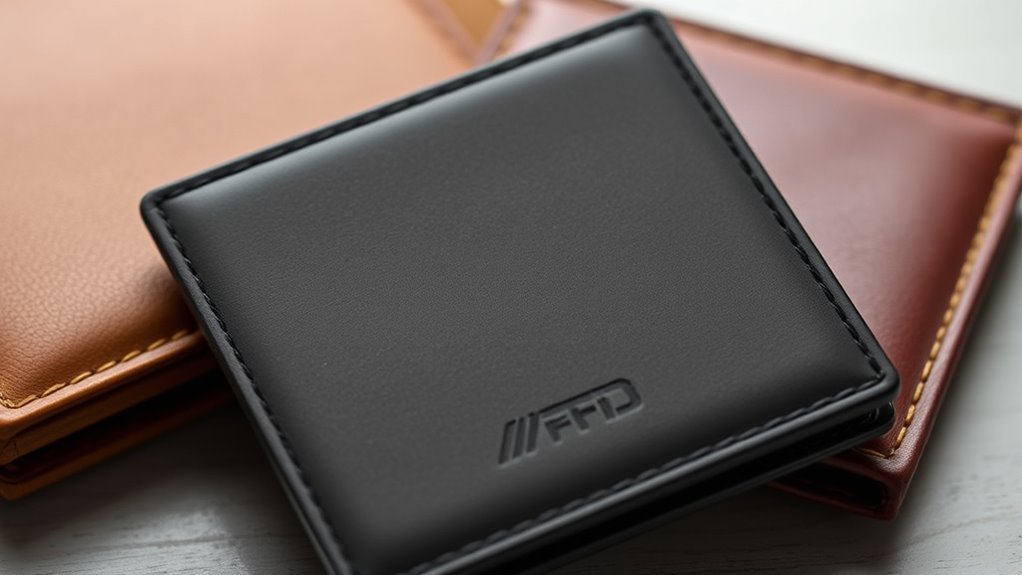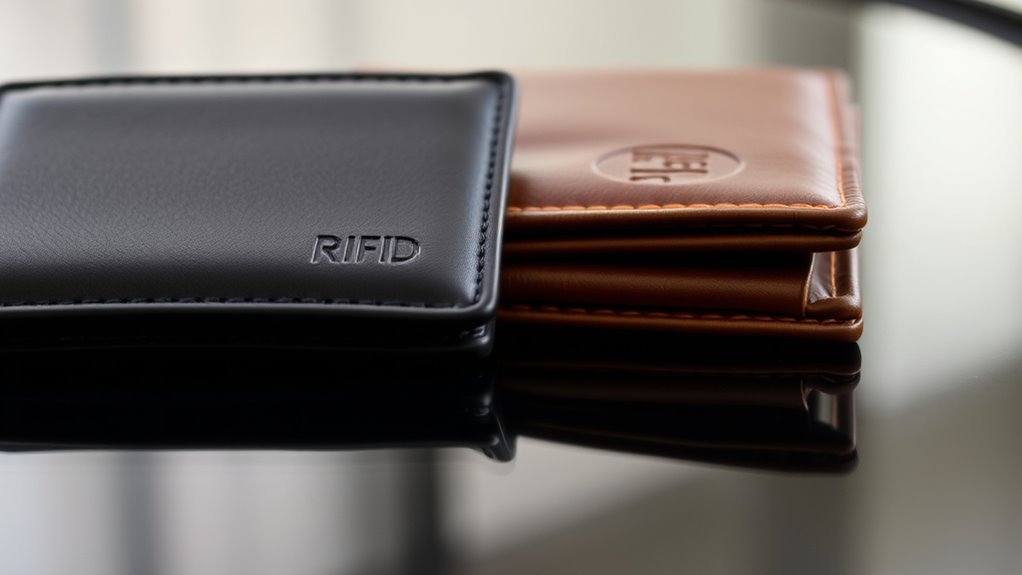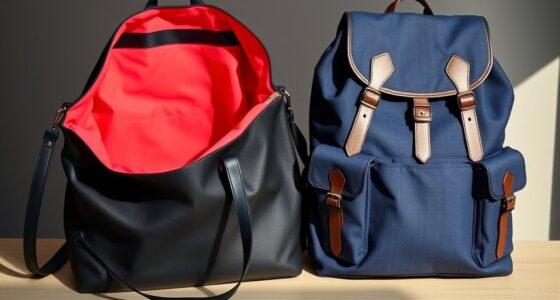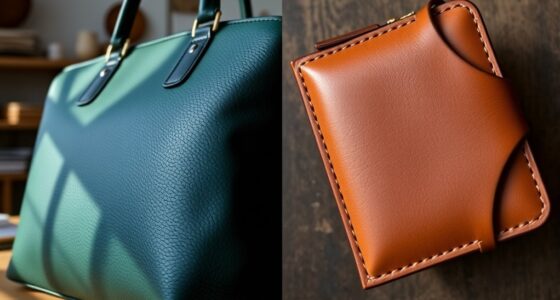If you prioritize security, RFID wallets offer better protection by blocking wireless signals and preventing electronic theft, which traditional wallets lack unless you add extra shields. They guard against RFID skimming and support contactless payments securely, giving you peace of mind during travel or busy days. Traditional wallets rely only on physical security and need separate measures for RFID protection. To find out how each option fits your lifestyle and security needs, keep exploring the details ahead.
Key Takeaways
- RFID wallets incorporate built-in RFID-blocking technology, preventing unauthorized wireless scans, unlike traditional wallets which lack electronic protection.
- RFID wallets safeguard against remote RFID skimming, offering enhanced security for contactless card data compared to traditional wallets.
- Traditional wallets rely on physical security alone and require separate RFID-blocking accessories for similar protection.
- RFID wallets support contactless payments securely while blocking signals, whereas traditional wallets generally do not support contactless features.
- The choice depends on individual security needs, with RFID wallets providing modern electronic theft prevention and traditional wallets emphasizing classic style.

In today’s world, choosing the right wallet can substantially impact your security and convenience. With the rise of digital transactions and contactless payments, your wallet isn’t just a place to carry cash and cards—it’s a shield against theft and fraud. When comparing RFID wallets to traditional ones, understanding their differences in theft prevention and how they support contactless payments helps you make an informed decision. RFID wallets are designed with built-in RFID-blocking technology, which prevents unauthorized scanning of your RFID-enabled cards. This feature is essential because thieves can exploit RFID technology to wirelessly steal your card information without physical contact, often from a distance. By using an RFID wallet, you add a layer of protection that traditional wallets lack, making it more difficult for thieves to access your sensitive data. This enhanced theft prevention can give you peace of mind, especially when you’re traveling or in crowded places where pickpocketing and electronic theft are more common. Traditional wallets, on the other hand, don’t inherently protect against RFID skimming. They rely solely on physical security—keeping your cash, cards, and IDs secure through traditional means. If your cards are RFID-enabled, they remain vulnerable unless you add separate RFID-blocking sleeves or cases. While traditional wallets often have more room and come in various designs, they don’t offer the same electronic theft prevention benefits. When it comes to contactless payments, RFID wallets shine because they are compatible with tap-to-pay technology. You can simply tap your RFID card or device against a payment terminal, allowing for quick and seamless transactions. This convenience accelerates checkout times and minimizes physical contact, which has become increasingly important. However, it’s essential to be cautious if your RFID wallet isn’t properly shielded, as it could potentially expose your card information to unwarranted scans. Many RFID wallets are designed specifically to support contactless payments while simultaneously blocking signals from unauthorized scanners, ensuring your transactions remain secure. Additionally, AI security advancements emphasize the importance of safeguarding digital and contactless payment methods against evolving threats. Ultimately, the choice between RFID and traditional wallets depends on your lifestyle and security priorities. If you frequently use contactless payments and want to guard against electronic theft, an RFID wallet offers better security and peace of mind. But if you prefer a classic style without the need for contactless options, a traditional wallet can serve you well—just consider adding RFID-blocking sleeves to protect your cards. Being aware of the risks and benefits of each helps you make smarter choices, ensuring your money and personal information stay safe while maintaining the convenience you need in everyday life.
Frequently Asked Questions
Can RFID Wallets Prevent Biometric Hacking Attempts?
RFID wallets don’t prevent biometric hacking attempts, as these involve biometric identifiers like fingerprints or facial recognition, not RFID signals. However, RFID protection in your wallet can guard against unauthorized reading of RFID chips, preventing digital theft of sensitive data. To defend against biometric hacking, focus on strong passwords, biometric security features, and device encryption. RFID wallets enhance your overall security but don’t directly stop biometric hacking attempts.
Are Traditional Wallets More Durable Than RFID Wallets?
Think of your wallet as a trusty old tree—its durability depends on the roots. Traditional wallets, often crafted from leather, tend to be more durable than RFID wallets, thanks to their superior leather longevity and resistance to wear. They withstand daily use better and handle banknote durability over time. So, if you’re after a wallet that ages gracefully, a traditional leather wallet is the sturdy choice that keeps your cash safe for years.
How Do RFID Wallets Affect Contactless Payment Convenience?
RFID wallets make contactless payment more convenient by seamlessly integrating with contactless technology. You can quickly tap your card or device without removing it from your wallet, saving time. Plus, they enhance payment security by shielding your card’s RFID chip from skimming, reducing fraud risks. This combination of ease and security means you enjoy faster transactions while keeping your payment information safe during contactless payments.
What Materials Are Best for RFID Signal Blocking?
You’ll find that metal shielding and conductive fabrics are your best bets for RFID signal blocking. Metal shielding, like aluminum or copper foil, effectively deflects signals, keeping your info private. Conductive fabrics, woven with metal fibers, offer a flexible, discreet barrier. Both materials create a subtle shield, ensuring your personal data remains protected without sacrificing style or convenience. Trust these materials to gently guard your digital footprints.
Do RFID Wallets Require Special Maintenance or Care?
You don’t need special maintenance for RFID wallets. Just keep them clean with a damp cloth and avoid harsh chemicals. Regularly check the credit card protection and theft deterrent features to guarantee they work properly. Store your RFID wallet in a cool, dry place to prevent damage. Proper care helps maintain the wallet’s functionality, keeping your cards secure and your personal information protected against RFID skimming or theft.
Conclusion
Choosing between an RFID wallet and a traditional one is like selecting a guardian for your valuables. An RFID wallet acts as a shield, symbolizing protection in a world full of unseen threats. Meanwhile, a traditional wallet stands for familiarity and trust but may leave you exposed to digital theft. Ultimately, your choice reflects what you value most: the comfort of tradition or the promise of modern security. Guard your essentials wisely, for they’re the keys to your peace of mind.









